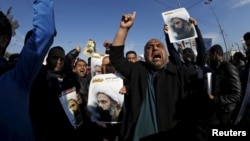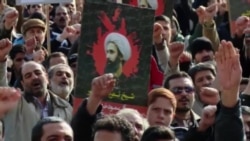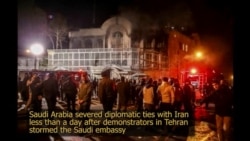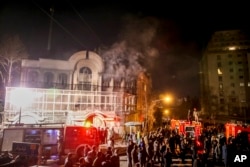Saudi Arabia's allies curbed their diplomatic links with Iran Monday, following Riyadh's decision to sever its relations with Iran after protesters stormed the country's embassy in Tehran.
Bahrain and Sudan cut their diplomatic ties to Tehran, while the United Arab Emirates downgraded its relations with Iran, limiting the number of Tehran's diplomats in the country and reducing the representation to a charge d'affaires rather than an ambassador. Saudi Arabia also announced that all flights to and from Iran have been cancelled.
At the White House, spokesman Josh Earnest stressed the the need for Iran and Saudi Arabia to "deescalate" the situation and urged all sides to show restraint.
The heightened tensions came in the aftermath of Sunni Saudi Arabia's execution Saturday of a leading Shi'ite cleric, Sheikh Nimr al-Nimr. After Riyadh announced his execution, along with 46 others, angry Iranian protesters smashed furniture and set fires at the Saudi embassy in Tehran, with demonstrators also attacking the country's consulate in Mashhad.
VIDEO: Analysts discuss message Saudi Arabia sent to Iran
At least 40 protesters were arrested in the attacks, which Iranian President Hassan Rouhani called "totally unjustifiable." But he also denounced al-Nimr's execution, and about 3,000 demonstrators took to the streets of Tehran Monday in protest of the cleric's killing.
Sudan said it was cutting Tehran ties because of the "barbaric attacks" on the Saudi embassy in Tehran. The UAE said it was curbing its Iran ties because of Tehran's "continuous interference in the internal affairs of Gulf and Arab states, which has reached unprecedented levels." Somalia denounced the attacks on the Saudi outposts as a "flagrant violation" of international law.
WATCH: Related video clip
A statement on the state-run BNA news service said Bahrain called on Iranian diplomats to leave the country within 48 hours. Bahraini police fired tear gas and birdshot at protesters demonstrating against al-Nimr's execution. Saudi Arabia, in announcing its move late Sunday, also gave Iranian diplomats two days to leave.
Iranian Foreign Ministry spokesman Hossein Jaber Ansari said at a Monday morning briefing Iran was arranging for its personnel to return home from their Saudi posts, but that none had yet left. He also criticized Saudi Arabia for its decision, saying Saudi actions are fueling tensions in the region.
Saudi Foreign Minister Adel al-Jubeir said Sunni-majority Saudi Arabia would not allow Shi'ite dominated Iran to undermine his country's security, or that of the region.
"The continued attacks on diplomatic missions is a flagrant violation of all international treaties," Jubeir said. "We want to make it very clear that there is no space in the community of nations for a country that condones terrorism, that supports terrorism and that engages in terrorism."
Iranian Deputy Foreign Minister Hossein Amir Abdollahian said later the Saudi decision could not distract from its "big mistake" of executing Nimr, who was a prominent critic of Saudi Arabia's ruling royal family. He was convicted in 2014 of sedition and other charges, and in 2011 was a key leader of Shi'ite protests in eastern Saudi Arabia.
The mass executions, the most in Saudi Arabia in more than three decades, triggered international outrage and warnings of grave repercussions for the Saudi royal family.
The U.S. State Department, in a statement, said Washington "will continue to urge leaders across the region to take affirmative steps to calm tensions." The statement also said President Barack Obama's administration believes "that diplomatic engagement and direct conversations remain essential" to resolving the crisis.
Iran threatens 'divine vengeance'
Earlier Sunday, Iran's supreme leader said Saudi Arabia will face "divine vengeance" for its execution of Nimr. State television quoted Ayatollah Ali Khamenei as saying, "The unjustly spilled blood of this oppressed martyr will no doubt soon show its effect and divine vengeance will befall Saudi politicians."
He also said Nimr "neither encouraged people into armed action nor secretly conspired for plots, but the only thing he did was utter public criticism rising from his religious zeal."
Angry Iranian protesters on Saturday stormed the Saudi embassy in Tehran and a consulate in Mashhad, smashing furniture and setting fires at the embassy before being ejected by police.
At least 40 protesters were arrested. Iranian President Hassan Rouhani called the attacks on the diplomatic missions "totally unjustifiable," even as he denounced Riyadh's execution of the 56-year-old Shi'ite cleric.
Iran's Revolutionary Guard said in a statement Sunday Nimr's death would lead to the "downfall" of Saudi Arabia's monarchy. The Guard described Nimr's execution as a "medieval act of savagery."
Iraq's Grand Ayatollah Ali al-Sistani called the execution "an injustice and an aggression."
Condemnations, warnings spread
A top Shi'ite cleric in Lebanon also warned of a backlash to Nimr's execution. Sheikh Abdul-Amir Kabalan described the execution as "a crime at a human level and will have repercussions in the coming days."
Protests also erupted in Bahrain, where police used tear gas on the crowds. Demonstrations also took place in India, as well as the Saudi embassy in London.
U.N. Secretary-General Ban Ki-moon said he was "deeply dismayed" by the execution of Nimr and called for "calm and restraint in reaction" to the killings.
Washington warned that Nimr's death would only add to strife between religious sects in the region.
"We are particularly concerned that the execution of prominent Shia cleric and political activist Nimr al-Nimr risks exacerbating sectarian tensions at a time when they urgently need to be reduced," U.S. State Department spokesman John Kirby said in a statement Saturday.
Iran and Saudi Arabia have been vying for leadership in the Muslim world since Iran's 1979 revolution, which elevated to power hard-line Shi'ite clerics. The U.S. war in Iraq further inflamed religious and ethnic tensions by leading to a Shi'ite-led government in Baghdad and a crucial shift in the sectarian balance of power in the region.
After Arab Spring protests erupted in 2011, Saudi Arabia and Iran entered into a fierce proxy war in Syria, where they support opposite sides of the conflict. The two foes also back opposing military factions in Yemen, where a Saudi-led coalition has bombed Iran-backed Shi'ite targets for the past nine months.









